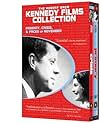Governor George Wallace will not let two black students into an Alabama school, against the wishes of President Kennedy. Loud shouts come from both sides of the issue as JFK stands by his de... Read allGovernor George Wallace will not let two black students into an Alabama school, against the wishes of President Kennedy. Loud shouts come from both sides of the issue as JFK stands by his decisions.Governor George Wallace will not let two black students into an Alabama school, against the wishes of President Kennedy. Loud shouts come from both sides of the issue as JFK stands by his decisions.
- Awards
- 1 win total
- Narrator
- (voice)
- Self - Assistant Attorney General
- (as Burt Marshall)
- Self - Confrontation Planner for Military
- (as General Abrams)
- Self - United States Marshal
- (as Marshal Norville)
- Self - Commander of Alabama National Guard
- (as General Graham)
- Self
- (uncredited)
Featured reviews
and Plays Out More or Less as it was Happening Around the July 11, 1963 Time-Frame, It Wasn't Staged, it was Shot Cinema Verite Style and Edited After the Fact.
A Few Things are Happening Behind the Scenes that Basically Assured the Kennedy Administration that the Outcome would Not Require the Use of Federal Force.
Taking Wallace at His Word, it is Alleged that Wallace Told the White-House He Would Stand Down After a Show of Principles, but the Federal Govt. Was Still Preparing for Anything to Happen.
It was a Night-Before Commitment that Things would Eventually be for the Good of the Country. (Alabama was the only State that refused integration of Universities).
Wallace Knew in His Heart of Hearts this was a Lost Cause.
On Screen He Says (paraphrasing)...I still believe that the Civil War was a stance of fighting for what you believe in...It was just that there were more of them then there were of us.
The Same Could be Said of His Current Dilemma...He was Fighting for What He Believed. Both Races were Better Off Apart, but the Overwhelming Majority of the States were Allowing Integration and Alabama Stood Alone, Fighting, but Still Alone.
The Outcome was a Done Deal Before it Happened and Wallace Stood in the Doorway to Block the Students (Vivian Malone, James Hood) from Entering.
Once, for Symbolic Reasons and Fulfilling His Promise to the Citizens. But the Second Time the Students Arrived...Wallace Walked Away, and the "Crisis" was Over.
Still, the Film was a Break-Through for Documenting an Important Historical Event with "A Fly On the Wall" Perspective and for that it is Priceless.
Note...President Kennedy was gunned-down in Dallas on Nov. 22, 1963, a month after the film was released. His brother and Attorney General, Robert, was killed by an assassin, 5 Years later, in June of 1968.
*** 1/2 (out of 4)
Robert Drew's fascinating documentary takes a look at the battle between President Kennedy and Alabama Governor George Wallace. Kennedy and his brother Robert are seen trying to get Wallace to step down and allow two black students to enroll at the University of Alabama but the governor stands to his ground. After PRIMARY, director Drew was given more access to Kennedy and it's pretty clear that the two of them knew this decision would be something big so it's pretty incredible that so much was able to be captured for this film. It runs just 53-minutes but there's certainly some drama here even though you know what happened at the school. I thought the film was extremely well-made and especially towards the end when the countdown starts on getting the two students into the school. Getting to see Robert Kennedy listening to what's going on in Alabama was pretty fascinating and you can see the drama going on just by looking at his face. Also, seeing the aftermath of the events was also rather special. It's hard to believe that this film was released just a month before Kennedy was assassinated so in some ways that gives it even more power when viewed today. It's hard to believe that this type of stuff was happening such a short time ago but this documentary does a very good job at capturing the moods at the time.
Did you know
- TriviaIn June 2023, this film was screened at the University of Alabama in Tuscaloosa in observation of the sixtieth anniversary of George Wallace's infamous and unsuccessful "Stand in the Schoolhouse Door" to try to obstruct desegregation. The building where it was screened, Foster Auditorium, was the actual location of that incident--in 1963, it had been the site of student registration, so it was where Wallace stood to try to bar Vivian Malone and James Hood from enrolling as UA students. In 2023 it is the site of the Malone-Hood Plaza (in honor of James Hood and Vivian Malone) and the Autherine Lucy Clock Tower (in honor of the first Black student to enroll in the university).
- Quotes
Robert F. Kennedy - Attorney General of the United States: I'm not very much in favor of picking the governor up and moving him out of the way. I think it'd be much better if we develop some system if we had enough people to just push him aside.
- Crazy creditsWith the exception of the narrator, cast members are credited orally during the movie by the narrator or by other cast members or themselves (on the telephone).
- ConnectionsFeatured in Television: The Rise and Fall of the Documentary (1985)
- Soundtracks(I Wish I Was in) Dixie's Land
(1860)
Written by Daniel Decatur Emmett
Played as background music for the first Alabama scene
Details
- Runtime
- 52m
- Color
- Sound mix



























